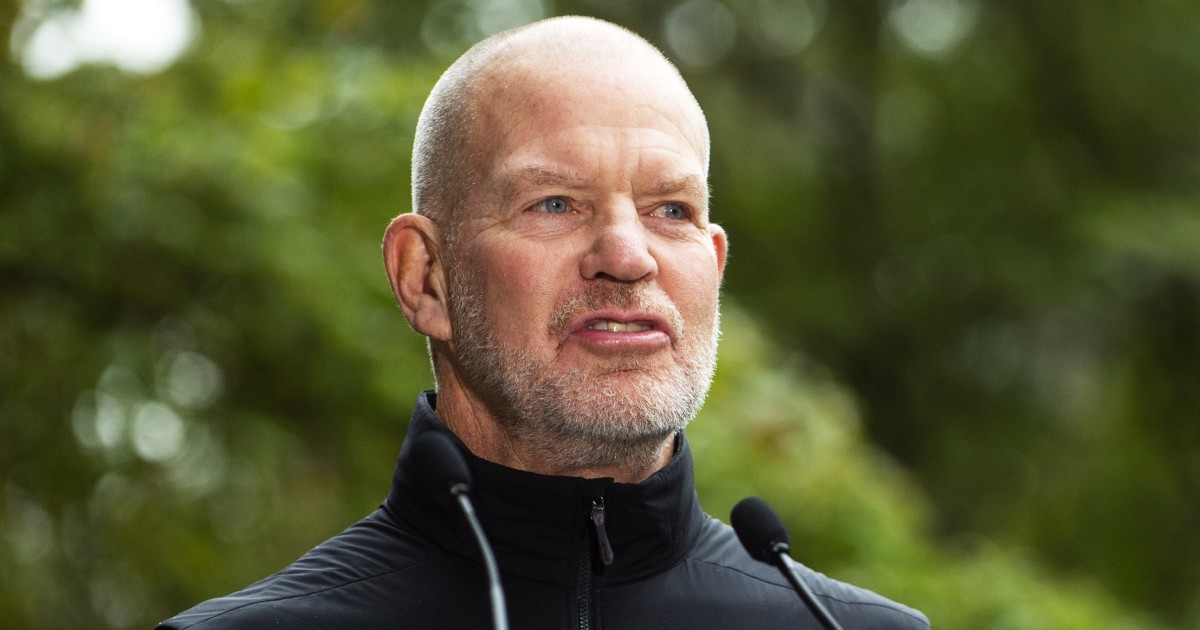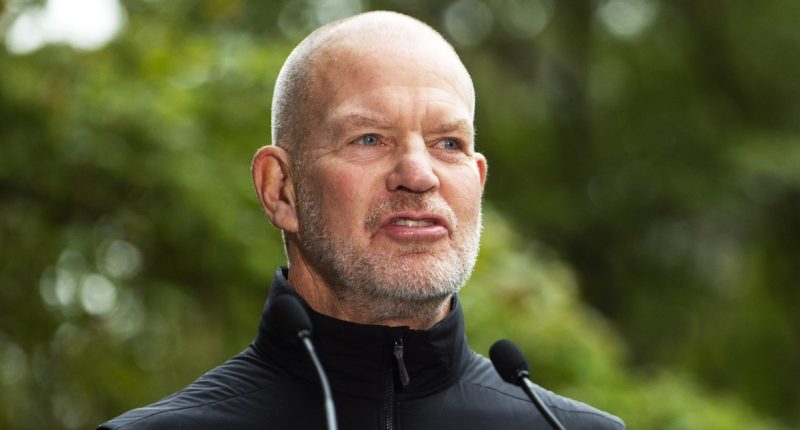
ATLANTA — Outside the Lululemon shop at Ponce City Market in Atlanta on Thursday, Donna Martin, a Black woman seeking yoga gear, learned that the company’s founder, Chip Wilson, had publicly bashed the notion of the brand embracing diversity.
“I don’t get it,” Martin, a project manager at a telecommunications company, said. “But I do get it. This is the world in which we live now, where someone who created a brand doesn’t want everyone supporting that brand. It’s so ridiculous.”
She shook her head. “I got the memo,” Martin said as she walked away from the store.
DEI experts like Tiffany Brandreth said Martin had the right idea: Black consumers concerned about Wilson’s latest dismissal of diversity, equity and inclusion should consider boycotting the retailer.
“There should be a loud call to action for a widespread boycott of corporations that overtly disparage and label DEI as practices rooted in racism and discrimination,” said Brandreth, an organizational psychologist who specializes in DEI. “It’s crucial for anyone who claims to be an ally for DEI to send a powerful message that these regressive values will not be supported that goes beyond mere rhetoric.”
Wilson founded Lululemon in 1998 and stepped down as CEO in 2013, but still owns the majority of the company’s shares, which are valued at $4 billion, according to Forbes.
During an interview with Forbes published Jan. 2, he blasted the company’s “whole diversity and inclusion thing.” He also sounded off on Lululemon’s ads because they featured people he called “unhealthy,” “sickly” and “not inspirational.”
“They’re trying to become like the Gap, everything to everybody,” Wilson said. “And I think the definition of a brand is that you’re not everything to everybody. You’ve got to be clear that you don’t want certain customers coming in.”
Wilson has made similarly controversial statements in the past, including his defense of one line of yoga pants that were unintentionally see-through for some wearers because “some women’s bodies just actually don’t work for it.”
After his most recent statements, Lululemon distanced itself from its founder, who has not had a role in business operations for more than eight years.
“Chip Wilson does not speak for Lululemon, and his comments do not reflect our company views or beliefs,” a statement read. “Chip has not been involved with the company since his resignation from the board in 2015 and we are a very different company today.”
Genesis Emery-Foley, a Los Angeles marketing leader, entrepreneur and DEI advocate sees Wilson’s statements as shortsighted, from a mere business perspective. The point of creating products is to appeal to consumers. Harnessing exclusivity, however, can lead to “ostracizing” people who don’t fit into the company’s target categories.
“This perpetuates the larger, complex challenge of the lack of diversity representation and inclusion across not only corporate organizations, but also in consumerism and our social climate at large,” Emery-Foley said. “So, to me, it is quite disappointing to hear that someone of such power, status and magnitude would promote the idea of separation and exclusion.”
On a consumer level, though, Brandreth said Wilson’s remarks should serve as a tipping point for a boycott — and not one that just “fades into being forgotten,” she said. Brandreth added that boycotting should be applied to any company affiliated with “regressive values.”
“The combined purchasing power of diverse groups is massive, so the boycott doesn’t need to be loud,” she said. “The economic choices of consumers sends a silent yet powerful message on its own. The most impactful way to effect change is by making consequences felt, which is directly through impacting these individuals’ financial gain.”
Beyond boycotts, Emery-Foley encouraged supporting Black-owned companies instead.
“The most powerful way to get a company’s attention is to really start doing what we should be doing anyway,” she said. “And that’s investing in our own communities, and creating pathways for the democratization of entrepreneurship and Black equity.”
“There’s no reason for us to wait for companies to do what’s right,” Emery-Foley added. “Change will arise when we gather together as a larger community and create our own ecosystem of all the things we fought for all these years.”
Wilson’s remarks, DEI experts told NBC News, reflect a growing — and alarming — attitude from business leaders that has weakened and threatened the field, which aims to assure fairness in hiring practices and inclusive work environments for all employees.
This is particularly concerning because in 2020, after the murder of George Floyd sparked a social justice movement, Black entrepreneurship rose and myriad companies professed a commitment to ramp up DEI practices to counter dramatic disparities in the representation of Black people in workplaces. But as time wore on, the commitments faded.
Google, which had announced in 2020 that it would make a significant DEI push, dramatically scaled back those efforts last year, with little fanfare. Meta, the parent company of Facebook and Instagram, dropped leaders and staffers who worked in DEI. The Supreme Court’s ruling in June to dismantle race-conscious college admissions has “absolutely” granted “permission to companies to deprioritize and further defund DEI,” Brandreth said.
The backlash to the wave of DEI efforts most recently came to a head this week with the successful campaign to push Claudine Gay, the first Black woman to serve as Harvard University’s president, out of her lofty position.
None of this is surprising to Krystal Allen, founder of K.Allen Consulting, a New Orleans company that trains corporations and other entities in DEI. She said Wilson’s rhetoric was driven by shortsightedness because of his status.
“When you’re talking about privilege, from a business standpoint, it is not shocking that he may not see the relevance and value of seeing human justice and human rights issues as connected to the bottom line,” Allen said. “Those individuals don’t understand how being inclusive, being equitable, embracing diversity actually drives the success of your bottom line because you’re able to provide a more enhanced customer experience. You’re able to increase employee retention and you’re able to operate with an elevated sense of excellence, because you’re not targeting one group.”
Dani Monroe, who founded the Martha’s Vineyard Chief Diversity Officer Summit, said this is a moment for civil rights groups like the NAACP and the National Urban League to move to the forefront. “They have to begin to advocate and use their voices to support diversity, equity and inclusion and get more organized around how do we stand up for ourselves and speak out,” she said, noting that the wave against DEI is gaining momentum.
And that momentum is being driven from prominent voices, Monroe said.
“I feel like we’ve got a Billionaire Bullies Club going on with Elon Musk, Chip Wilson and other very wealthy people attacking DEI,” Monroe said. “And you have to ask why. The why is because DEI is a very powerful strategy to create fairness. And the motivation that’s driving this attack on DEI is that there’s a strong bias they’re operating. These are very entitled men. Some have the impression that diverse people are getting things or opportunities they don’t deserve, aren’t qualified for and shouldn’t be entitled to certain seats of power and privilege.”
The paradox is that Black consumerism drives many of these company leaders’ success.
“Individuals like Elon Musk continue to profit from the same individuals they hold prejudiced views against,” Brandreth said. “There’s little incentive for them to reevaluate or alter their discriminatory and oppressive perspectives if we keep working at their companies and keep buying their products. By choosing not to work for such companies and refraining from purchasing their products or services, it directly hits where it matters most.”
For more from NBC BLK, sign up for our weekly newsletter.
Source: | This article originally belongs to Nbcnews.com









